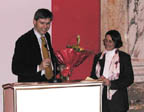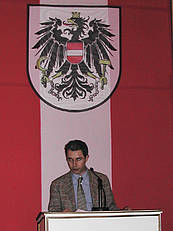On January 14, 2003, Mag. Werner Wutscher, Secretary General of the Federal Ministry of Agriculture, Forestry, Environment and Water Management, presented the Austrian Society for Agricultural Economics (ÖGA) Research Prize, donated by Federal Minister Wilhelm Molterer, to Dipl.-Ing. Dr. Ika Darnhofer, a university assistant at the Institute of Agricultural Economics at the University of Natural Resources and Life Sciences, in recognition of her research in the Marble Hall of the Government Building. Her work was selected from among several agricultural scientific papers by Prof. Raffaele Zanoli, an independent, international reviewer.
The ÖGA Research Prize 2002 recognizes innovative approach to the topics of “Dealing with Change” and “Analyzing Decision-Making Processes on Agricultural Businesses”
The award winner's professional and personal careers have been characterized by internationality, diversity, and openness to new ideas. Born in Klagenfurt and raised in Africa, where she attended a French school, she studied at the University of Natural Resources and Life Sciences, wrote her diploma thesis in Kenya and her dissertation in Ethiopia. After completing her studies, she worked in the private sector, first at a management consultancy in Vienna, then in the executive suite of a company in the USA. Her return to Vienna coincided with her return to the University of Natural Resources and Life Sciences, where she researches and teaches, first as a research assistant and now as a university assistant at the Institute of Agricultural Economics.
The award winner's diversity, openness, and internationality are also reflected in her submitted work, which consisted of several articles published in international scientific journals. The articles address two topics: the characteristics that agricultural businesses should possess in order to survive in the long term and the decision-making processes of farmers.
As the framework conditions are changing ever more rapidly, agricultural businesses are increasingly required to be adaptable. This requires farmers to be willing to learn and be flexible. On the other hand, the market demands increasing specialization on farms. However, this specialization, even if it may ostensibly lead to success in the competitive environment, poses a significant risk, as it limits adaptability and thus makes the farm vulnerable to crises.
In her study of farmers' decision-making processes, the award-winning author not only considers economic aspects, but also incorporates the diversity of considerations that farmers incorporate into their decision-making.





